#magnusarchives
Explore tagged Tumblr posts
Text
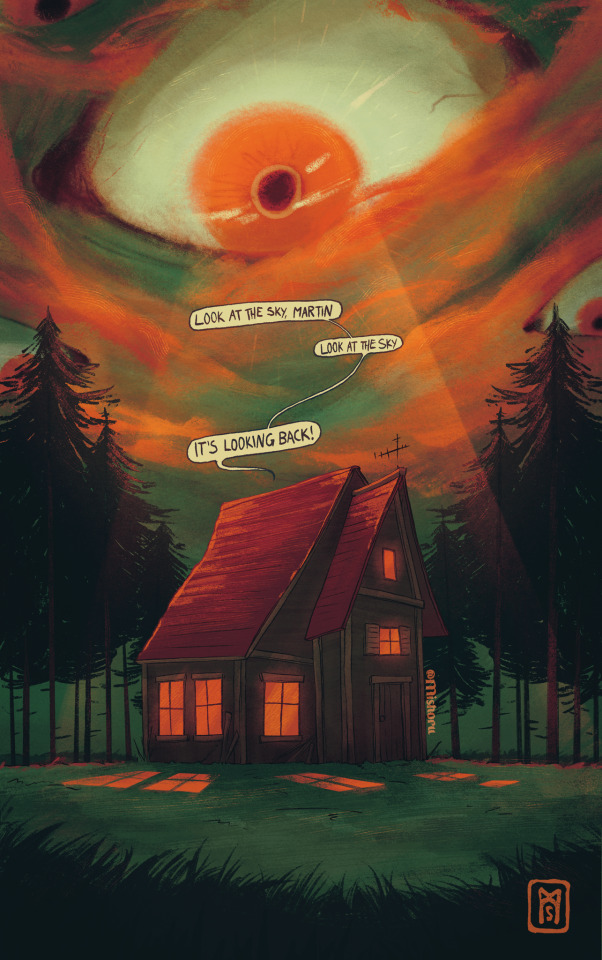
i am so normal about this podcast
#illustration#art#procreate#tma jmart#tma#the magnus archive fanart#the magnus archives#magnusarchives#magnus archives#jon sims fanart#jon sims#martin blackwood#jmart#ceaseless watcher#the archivist
20K notes
·
View notes
Text
My Magnus Archives artbook
The music is Spectrum by Boards of Canada
#tma#fanart#magnusarchives#darkart#art#illustration#drawing#horror#イラスト#the magnus archives#tma fanart#rusty quill
733 notes
·
View notes
Text
I heard this sound on tt and yeah this is the result ☠️☠️☠️
Peter has had enough but marries him anyway ALSHHSJQA
#tma#magnusarchives#magnus archives#magpod#elias bouchard#peter lukas#jonah magnus#lonely eyes#lonelyeyes#the magnus archives
2K notes
·
View notes
Text

pipeline weak sarcastic nerd ---> lovcraftian demigod who doesn't know how to human anymore (but is trying)
[timeline de peinados, barba, cicatrices, outfit, poderes y personalidad de Jonathan Sims a lo largo de las temporadas según yo las imagino] 👁️🧿👁️🗨️👀💚🩸🥸🛐🥴💀📼🕸️
Just binged TMA in less than two weeks. I'm dizzy and obsessed. I can't believe it took me this long to get into it. Drew this in a trance. Jon they could never make me hate you<3
•do not repost •
odio como quedaron la mayoría de estos Jones. No sé hacer barbas. El color se tradujo re mal de la compu al celu. Enfin
Anyway así es el formato con el que lo subí a Instagram ( y el boceto final):




yes I am implying that the t-shirt daisy dreamt about was a Dua Lipa 2017 tour shirt
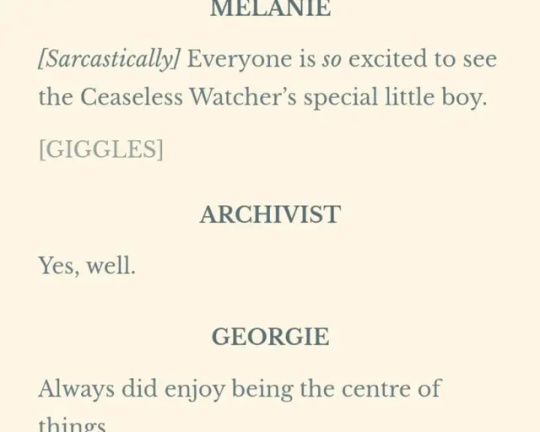
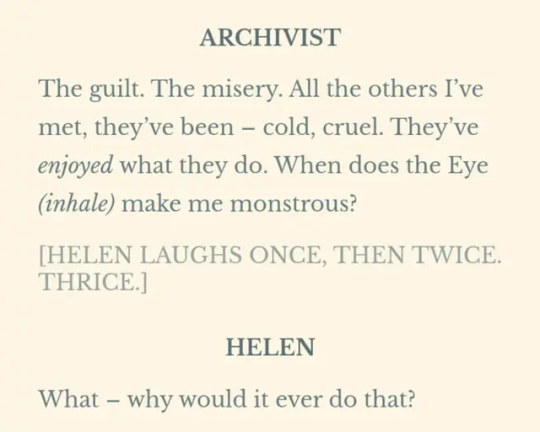
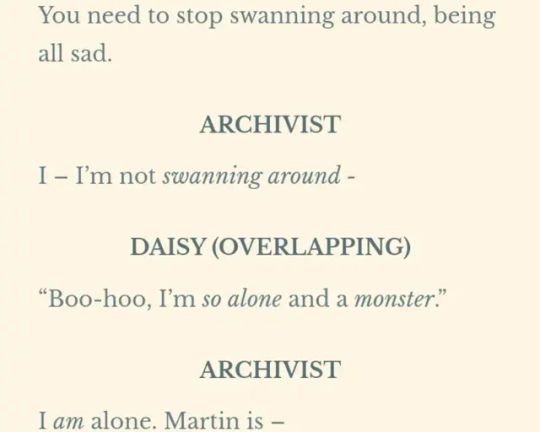
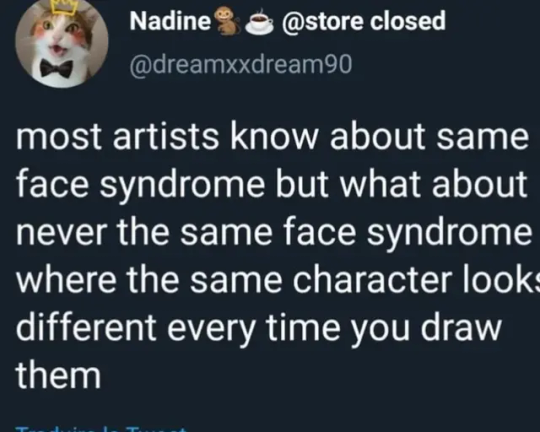
#jonathan sims#jonathan simms#jon sims#john sims#tma#the magnus archives#the magnus universe#magnus pod#the archivist#Jonathan sims#the Magnus archives#magnuspod#magnusarchives#archivist#thearchivist#the ceasless watcher#jonathan sims fanart#jon sims fanart#tma fanart#the Magnus archives fanart#magnuspod fanart#the archivist fanart#tma spoilers#tma podcast#magnus podcast#MAG200#MAG 136#MAG142#MAG 165
56 notes
·
View notes
Text
me: I should dress like a mysterious and gothic librarian who holds paranormal secrets and mystically knows yours, reading the stories of everyone and piecing together everything that’s happening
me: hey wait who does sound like
me:….
me: AHHH-
#the magnus pod#magnusarchives#the magnus institute#the magnus archives#magnus archives fan#tma podcast#tma fan#unintentional cosplay#jon sims#the archivist#am I the archivist?#Hopefully not#Still only on episode 126
28 notes
·
View notes
Text

TMAGP 16 is hard to listen to for no reason other than this is the cringiest fucking shit I’ve EVER listened to listening to this girl speaking the way that she is makes me want to die more than anything. I know thats the point but UHG Alexander you are an animal. The sound effects?? Puke. Am I being dramatic? Absolutely.
But ink5oul is my nonbinary idol
30 notes
·
View notes
Text

I present my sweet little man Archibald Baxter! Originally an incredibly angsty Avatar of the Lonely and End (Magnus Archives). But now is a gay lil twink of a man who enjoys his books and piano.
he's apart of a story I'm working on that deals with the mind!
Genuinely a comfort character for me as he's just someone I put my want to be left to my own devices/ more homebody ways. He can be very jumpy around people and very easily flustered.
#my art#art#character art#artists on tumblr#ocs#digital art#magnusarchives#the magnus archives#I put the magnus tags on here because uhh y not lmao#coela art#coela ocs
26 notes
·
View notes
Text
MAG146: Threshold. An Excruciatingly Deep Analysis. Word Count: 6702 .
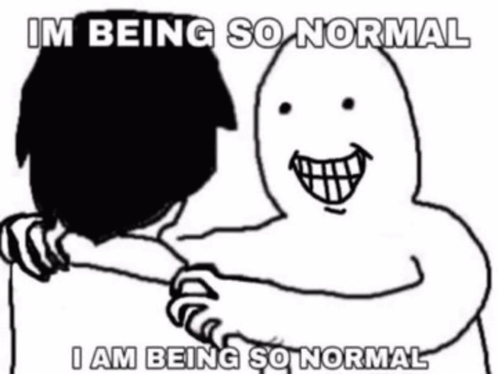
The Final scene in mag146 is something i think about often. It wasn't a scene of the three assistants confronting Jon at Martin's behest, it was a scene of desperation for a tangible target that couldn't overpower them the way every other monster had, that could be loosely quantified as deserving every ugly emotion they've had to direct inwards. I think a large part of season four as a whole, is the lack of a "big bad guy" and how the absence of one big pure evil enemy can actually. make things worse sometimes. because back when Elias was present everyone had someone to blame. all their anger about their respective situations could be tied back to Elias and so everyone had common ground in their hatred for him, they had an outlet. Tim and Melanie both lashed out at almost everyone but in the end it was Elias Melanie tried to kill multiple times. It was Elias that Tim's rage always traced back to, and they he held as the true evil until his bitter end. Basira could blame Elias since he's the one who practically forced her into joining the institute to save Daisy. It made things easy. It was simple because it's so easy to direct all your hatred towards the person who's the obvious big bad antagonist. But as soon as Elias was not present anymore, none of them had that outlet anymore. That's a large part of the reason that Jon’s the one being scapegoated. He's the only one with no connection to them all. And the only one they can safely turn their rage towards. Basira and Daisy have a bond near unbreakable due to their history, Melanie and Basira went through the trauma of the Flesh attack together, Daisy and Melanie have the common thread of both being people attempting redemption despite it being what feels like their nature. And through this, they all have something connecting them all. With Jon, there's a lacking in that common thread. Especially since it was Tim who saved everyone from the unknowing. Plus, what makes Jon easy, is the fact that they can trace even just the littlest something involved with him. The point is, when Elias was there, everyone had something they could tie reeeally directly to their issues. But now thats he’s not. Jons the next closest thing. And many aspects about who he is as a person makes it ever so easier to put blame on him. Not only is he non confrontational and self blaming, so he doesn't have it in him to be a danger to anyone who may confront him. But, with the rapid deterioration of his mental state, he's been making bad decisions. He's been unintentionally hurting a few innocent people. And those two things combined are just enough to make him the perfect replacement outlet. Because god with everything they're going through they need something. Because, all in all, it's nobody's fault. And that is the hardest fact for anyone in their situation to accept. Because blame is easy. Blame is simple and blame lets you cast all your misfortunes onto one person without having to take painful responsibility for them. And right now? Fate is the one at fault. Everything is being subtly influenced by the web in a way that simply makes it so fate was the sole decider all along. The end was decided from the beginning. Nothing could have helped that fact. Everybody wound up in their positions because fate deemed them unlucky souls and no matter what they hoped or dreamed or wished to do there was nothing that could have been done because every single one of them was just a plaything for destiny to reel at. And that is the absolute most excruciating thing to accept in their circumstance. Because none of them can handle what they've gone through. And to accept that there's absolutely nothing that ever could have been done about it is. Devastating. Because why should Jon have been born to suffer, why should Melanie have had to live a life built off a burning stick tower of shaky rage, why should Daisy have had to live the life of a desperate predator that she can barely redeem herself for, why should Basira have to dedicate her life to something that-
has only ever backfired on her, and went through so much trauma because of. Every single one of them is at the absolute worst possible spot they could be at for one reason or another (except possibly Daisy), so what other option do they have besides creating blame when the alternative is accepting it was hopeless all along. They're all desperate. Now, to further explain my next point i'm going to bring in some historical context for the term "scapegoat. Based in the Bible, a scapegoat is one of two baby goats; the other is sacrificed, while the other is sent into the desert, carrying all of the sins and impurities with it. The idea is initially mentioned in the Book of Leviticus, where a goat is assigned to be sent into the desert in order to carry away the sins of the community. Historically, this can be seen in many concepts. All of which are corrupt, and yet simultaneously used as one massive coping mechanism for the ways things are. The term though, interestingly (and ironically seeing a trend in historical scapegoats) enough, is rooted in ancient Judaism. Once a year, during Yom Kippur, Cohen Gadol sacrificed a bull as a sin offering to atone for all the sins he had inadvertently committed during the year. Then he took two goats and brought them to the door of the tent. Two goats were chosen by lot: one offered as a blood sacrifice, and the other as a scapegoat to be sent into the desert and pushed down a steep chasm where he died. The blood of the slain goat was taken behind the curtain into the Holy of Holies and sprinkled on the closing plate, the lid of the ark of the covenant. Later, the high priest confessed the intentional sins of the Israelites to God and figuratively placed them on the head of another goat, the scapegoat Azazel, who would symbolically "take them away". Now this is a very important analysis of a "scapegoat" because of how it narratively fits into the magnus archives you'll notice, that in the more ancient torah based description, it's abundantly clear that rather than simply an instrument for atonement, the goat is a sacrifice. The sins of the world were all placed on a rather innocent creature, and due to this, it met its untimely demise for reasons none other than fate. I like this specification, because I think it shows a really important context for the situation Jon is is. He isn't just being blamed for other people's problems, he's being utterly destroyed by them. Jons mental deterioration throughout the season has been nothing but noticeable in every way possible. And really? It's mostly due to that. He has an i n s a n e amount of survivors guilt at this point as pointed out by Daisy in Scrutiny, "And of course, for John, there’s survivor’s guilt in there, too. He thinks he’s not human. Makes him very… self-destructive.". So to have such an immense amount of guilt, and then have all the people around you, who you strive to have some sort of trust with, place all this blame on you, is detrimental. Not only is it a punishment perfectly tailored to match what Jons weakest point is, but it's also one that puts him in a cycle of agony that makes the entire situation worse. A sacrifice. It sends him into a vicious cycle of [ deteriorating due to being blamed -> not being able to sustain the pressure and agony of it and needing more statements -> taking more statements -> scapegoated for taking statements -> deteriorating due to being blamed ]. He's caught between a rock and a hard place with the situation because the ways the assistants are coping with their situation is directly contributing to exactly what they get on him for. They see him as a monster for doing what he does, and continue to deliberately try and make him feel worse, which only makes him need to do more of what they hate him for and no on and so forth. It's a vicious cycle full of unhealthy coping that none of them know how to withstand.
So, now that we have down the motives for scapegoating Jon and where Jon stands in the situation and what narrative role he's playing, we can now move on to the scene itself and the fundamentals of each character's stance in it.
Coping: and how it interferes with regression of development.
Firstly, I'm going to be starting with Daisy and there's a chance it's because she's my favorite and there's a chance it's because her stance is the most interesting. I lied, it's because she's my favorite! But either way, Daisy in this scene is the most conflicted character, and for extremely good reason. You'll notice that in her speech, she's almost desperately trying not to take sides, because she's the most aware of all the characters. She's undergone the most development and because of it is able to understand perspectives to a point where taking one is just something that's too difficult for her. After escaping the grasp of the Hunt, she's dedicated herself to atonement. Daisy has done terrible, inexcusable things in the past in order to feed the hunt. And since escaping it has done every single thing in her power to make up for it, no matter how hard. But the thing is. She's just as affected as all of them. And that's what makes her actions in this scene so interesting to look at. Because she can. not. blame Jon. She was Jon not too long ago she sees herself in him to a point where its painful. Because she too was caught in a place where she had to do things she knew were wrong simply to satisfy the desire of the hunt. She knows just how hard it is she knows the agony that Jon’s having to go through so she can't stand to see Basira and Melanie acting like he has full control. And yet at the same time, she can't bring herself to go against Basira. Because just as much as she knows where Jon is, she was on the police force with Basira. And cant help but see the justice side of the argument. She can't help but see how her circumstances differ from Ions in a way that Basira points out. So as much as she can see herself in where Jon is, she's incapable of not also being able to understand the points being made by the rest and where they are coming from due to how she knows that the logic for herself cant be applied to Jon. Since Jon knows what he's doing and she didn't. Since Jon hasn't been able to resist but she has. And a part about that fact is that it's Basira making it. She also still has a loyalty to Basira that makes it. Very, very difficult to fully go against her. So she becomes caught in a place where taking full, distinct sides, becomes a difficult endeavor. In the interaction, she's never the one making the points against Jon, but she's also not the one ever advocating for him. She makes a single comment about how Jons situation was similar to hers to try and reason was Basira slightly, but shut up about it after a few vague comments once she saw how driven Basira was in her convictions. BASIRA - You’re a danger, John. A monster. You’re hurting innocent people. ARCHIVIST - So did Daisy. BASIRA - Shut up. It’s not the same thing at all. DAISY - Basira. He has a point. BASIRA - You didn’t know what you were doing. [DAISY MAKES A PAINED SOUND, AS IF TO CONTRADICT HER, BUT STOPS.]. In this interaction especially, you can see just how tied she is between her understanding of both sides. She knows what Jons going through, but she also knows the differences in their circumstances, and it's not something she has solid ground to argue for. Now, bringing the regression topic in, I'll talk about how playing into this coping regresses her development as a character. Daisys current arc, and the one she's been having, is about fighting against her own monster hood. It's about resisting herself. About recognizing what she's done and atonement for it. It's about trying rather than succeeding. It's about fighting against your nature for what you know is right. So when upon seeing someone whos in as pained and monstrous a condition as she was, she cant bring-
herself to fight for them due to inconsistencies with what she believes, she regresses back to the person she was. The one who let their own morals get in the way of what was right. The one who allowed people to get hurt simply because it was "for the greater good." The way that regression is highlighted for her in this scene is how a blinding sense of morals and justice becomes too bright for her to act on the right thing. Even when staring at a pitiful version of the person she used to be. Character regression here works in the way where when tasked with empathy and understanding, she instead prioritized her own personal way of seeing things.
Second, and much more simple of a spectacle to observe: Ms Melanie King. Melanie is a lot simpler to talk about, and mostly since her motives and ways of thinking are very direct and straightforward. Melanie is a character plagued by anger. She drew an unlucky hand in life, and the only way she was able to rise up to become a person she could be proud of was through fighting her way there tooth and nail, scratching and kicking and biting. So when everything comes crashing down on her. When everything she fought with her life for is suddenly destroyed, she can not blame herself. Because if she admits to herself that it was simply fate's fault that her career collapsed and that it was her fault that she joined the institute in the first place, then it means that everything will have been for nothing. And that her absolute rock bottom in life was all and only because of her. That. is NOT something she can face. And the rage that was once used to build her up in life, is redirected towards the ones who she sees fit to blame. First it was Elias. He hired her, he's the one commanding under the name of the eye, he's the one whose fault it is, and he's the one who she's going to take her rage out on. And so she did. And then Elias was gone. And her rage was taken over by the slaughter. In the time Jon was in a coma her anger festered, it grew, it empowered her and became more a part of her than ever. So once Jon was back, she had an outlet again. And boy did it make it ever so easy for her, though all through good intentioned. Jons surprise little surgery to help release her from the slaughter, the fact that it was her statement she made to him that got her involved with the institute at first, the fact that he's becoming less and less human. So many things about what Jon was doing and had done made it horrifyingly easy for her to place her rage on him. And so, all her anger was redirected towards the archivist that ruined her life. I think at this point it's also worth mentioning Melanie's pride and how it plays into her as a character. She's undergone a l o t of character change. But aside from her frustration the one thing that's stayed stagnant about her as a person is her pride. She took great pride in where she managed to get herself in life back when Ghost Hunt UK was up and her life was at its peak. It was her pride and joy and it's what boosted her ego so high because it's something she did for herself with her own bare hands. So when that collapsed, one of the massive reasons that she needed to blame someone so bad was due to the fact that if she admitted that it was her fault, then all that pride would have collapsed with the rest of her life. Navigating blame away from herself and avoiding acceptance is her way of preserving her ego, which is the only thing she really has left after all she's undergone. And due to this ego, it's also what makes her the most stubborn and fierce during this scene. And so, so willing to go against Jon at any and all costs. But tracing back to this pride of hers, I think it's an aspect that's actually quite a lot during the intervention. The moment Jon refers to her as being a character in an explanation of his she immediately assumes he's trying to blame her for it all. [ ARCHIVIST - The second was… it was after I got stabbed by Melanie. MELANIE - You are not putting this on me ]. She does this again, but this time when Jons agrees with her, this being a blow to her ego that someone like him could even think to agree with an idea of hers. [ ARCHIVIST - She does have a point. MELANIE - I did NOT ask you.] So now that motives and reasoning are out of the way, it's time to explain how regression is doing its work on Melanie here. Melanie's key point in her development as a character is. actually almost hilariously obvious to a point where she's actually seen as reasonable for a split second of her life. She got therapy.
An honestly hilariously smart solution to the arising problems but. It was impressive for Melanie. Because her getting help after never once leaning on anyone around her was a massive step for her. It was a release of her pride, a recognition of her needing help from someone, of realizing she wasn't ok, and going out and getting it. Which god is more than can be said for most characters but essentially what therapy meant for her character development, was that she was finally taking a step to acknowledge her irrational anger and work to fix it. What happened in this scene for her, was a messy entanglement with the automatic unleashing of anger that she's always been so accustomed to, and the fact that she just took a massive step to stop that habit of hers. Regression is present here in the way that here, it's that automatic unleashment that ends up dominating, and becomes what overtakes her in this scene. The person she's been trying too hard to become fades away, and she moves back into the bitter, angry, spiteful person she was at the beginning of season four, still infected with the slaughter.
Basira is. undoubtedly the most complicated one. Daisys motives are the most contradicting, but Basira is the most dominant figure in what's happening, making her actions the most intense, and controversial. Basira is. complicated. She's extremely justice oriented and will do just about anything if it's for the wellbeing of the innocent and good of the world. She doesn't have the same "maul and kill the bad protect the good '' philosophy as Daisy, and is much less violent, but nonetheless lets her judgment of if people are good or not define her actions. And this goes for just about everything she has an opinion on, even changing what she thinks drastically if someone's morals shift. The only exception to this rule is Daisy, who seems to always have some affection towards whether what she's doing is good or not. The only time she's ever intervened with Daisy's immoral behavior is when she was going to kill Jon, who was someone Basira saw as moral. This type of mindset of hers got to the point where she completely turned on the police force the moment she recognized it as corrupt without even a second thought or dilemna about what she had sacrificed years upon years of work for. Unlike Daisy, who's developed to be able to see in shades of gray, Basira is still stuck at a point of black and white thinking. Deeming people as either "good" or a "monster." However over time, what went from just a mindset, became an utter and absolute crutch for her. She kept having to save herself from more and more situations. Rayners incident where she had to save herself from the chaos of the situation to when she had to rely entirely on her own head and wits to survive the unknowing, Basira slowly yet surely gets to a point where she can only trust to rely on herself, and her logic. After being through hell and back in Section 31 and then the institute she longs for stability, and gets this by having a rock solid state of mind that develops into the one and only thing she can depend on This gets especially reinforced in season four, when she's forced to take a leadership position. After the unknowing, her one, true last anchor besides herself disappears. Daisy was the one thing she could always count on, the one thing that was always there as an undeniable constant no matter what. But after Daisy was gone, she was left truly alone. So with Jon gone, Elias in prisoned, Martin out on his own agenda, and everyone else besides Melanie dead, she's forced to take leadership of the operation that is the archives. This in itself makes her extremely self sufficient. Becoming more and more self reliant and she increasingly loses anchors. This is likely around the time that she started really looking up to Gertrude, someone who all by herself did an unbelievable amount of justice for the world no matter what it took, or who had to be sacrificed to do it. Gertrudes self sufficiency, her effort, her efficiency, her image, everything Gertrude was, Basira strived to be. She's entirely independent, researching her own things and going all around the country without telling anyone about what she's doing. Leading all the operations such as the stopping of the dark ritual and now, going to investigate hilltop roads. She's undeniably retreated into herself, and no longer is used to being anything but autonomous. Because relying on herself for everything is how she copes. She turns herself into a pillar of stability which she must never leave, terrified that she would otherwise collapse. However despite seeming logical, she also greatly uses Jon as just as much of a scapegoat as Melanie, albeit more subconsciously. The problem that arises with Basira a bit more, is bias. Bias towards what's helpful to her personally, bias towards stability, and a strong bias against things that both destable her, and don't fit her view of justice.
I'm going to have to try and word this simply because Basira is a little complicated, but essentially, her black and white view of the world mixes with her biases very badly. Being either extremely tolerant, or extremely intolerant. Due to her self sufficient development, she has automatic favor towards anyones who's useful to her. Aka: Melanie. During the flesh attack, Melanie saved her life. Melanie got Helen as an ally. Melanie helped her research and upkeep of the archives when nobody else was around. And otherwise, has stayed out of her way. Due to Melanie having been useful to her, she sees Melanie as a person on her "good" list. And is willing to excuse Melanie's emotional outbursts, and justifies them. She also has automatic favor towards people who provide her stability: Daisy. Daisy has had her back for likely at least a decade. She's always worked together with her, always helped her, always provided a sense of stability for her to rely on, and was a powerful unstoppable force that Basira found comfort in depending on. Daisy was also someone Basira became extremely trauma bound with, enforcing the fact that Daisy would constantly be relied upon. Because of this, Basira looked past her immoral behavior on the police force. Daisy also earned a spot on her "good" list. However, Jon has ever provided for her in a way where she can have this favor towards him, and if anything goes against the exact things that she values Melanie and Daisy for. Unlike Melanie, Jon has never helped her or been of use to her. He's never saved her, never gotten her in the nick of time, never assisted her in something great, and overall has really never been a person that has been of good use to her. Unlike Basira, he's extremely unreliable. He's messy, jumps into action without thinking, he's self sacrificial in the stupid way, always gets himself into danger, is sloppy with plans, puts himself and others in danger, and is the last person you can rely on as a sturdy boulder. So not only does Jon not possess the qualities she tends to favor people over, but similarly to Melanie she associates him with being put in danger due to him being unhelpful at some of the most dangerous places shes ever found herself in, including the unknowing, the stopping of the "dark ritual". And most other scenarios where she's been put in danger, and needs someone to assist her. That being said, this means that she's not willing to look past anything he does due to lacking in the favor that people like Melanie and Daisy have. This especially works in the opposite of Jons favor when the things that he happens to be making mistakes on, is exactly what Basira values. Justice of the innocent. So when you combine ALL these factors.
Combine her need to be bold, black and white, stubborn and unmoving at all costs [ BASIRA - How many. ARCHIVIST - Basira…BASIRA - How. many. ] [ BASIRA Enough. ]. [ BASIRA -Then we go. Now. Unless, anyone has any objections. ]
With her newfound need to be independent, autonomous, self sufficient, self reliant at all costs [ BASIRA - No. if he is being controlled, we need to know. And we need to know now. Tell me where she is. ] [ BASIRA - Fine, I’ll go, then. I’ll do some recon on my own, and update you. ]
And finally, her biases towards those she favors mixing with her strong sense of justice [ BASIRA - Why do you think? Because he was ashamed. ] [ BASIRA - You’re a danger, John. A monster. You’re hurting innocent people. ARCHIVIST - So did Daisy. BASIRA - SHUT UP. It’s not the same thing at all. DAISY - Basira. He has a point. You didn’t know what you were doing. BASIRA -And since you did, you’ve spent every waking hour resisting. He knows exactly what he’s doing. ] [BASIRA- You don’t get a vote. ]
Now that I've discussed the individual characters and their stances and motives, I want to give my personal review of this scene and it's mostly just. My goodness. Jonathan Sims is scarily good at writing characters. I feel like a lot of writers often don’t go into the messy details of what trauma does to you as a person. A lot of the time characters will go into scarring events and come out only slightly affected. But what's really done so, so well, is the realism put into the coping styles and reactions of each character. They don't react to their trauma in pretty, romanticized ways. Melanie especially depicts this. She has rage outbursts that have ruined her almost all her relationships, she becomes violent out of fear, she reacts irrationally due to defense mechanisms, shes messy and shes vengeful and shes angry and the ways in which she acts in order to protect herself whether its stabbing Jon and other violent outbursts, or a general inability to communicate without thinking the other person has bold intentions to hurt her. She screams at Jon, blames him for all her problems despite him being responsible for dead zero of them, and turns fearful and livid at the sight of him. She's traumatized and it's not depicted in a way that's supposed to get the point across while still preserving love for the character. They aren't afraid to make characters genuinely unlikeable for the sake of realism and it's represented s o well. And she isn't the only character who does this when faced with trauma. Tim becomes bitter towards everyone around him and vents his rage on anyone who comes too close. Martin becomes hateful, spiteful, and self isolating. Basira takes complete domination in order to be in control of situations, and becomes accusatory, cold, selfish, unfair. I could go on and on but there isn't a single characters whose reactions art brutally honest to what anyone would say or do. they are unpleasant and messy and excruciating but they're human, they are unapologetically human. heres a perspective that wasn't so easy to see coming, but it actually fairly crucial to this entire scene and what exactly it means. Martin. Martin was the one took the tape of the bystanders interaction with jon, and left it out for the others to see. A silent instruction to intervene. Which. Dear god shows a lot about who he is as a character and just why the lonely is benefitting so much from him. Martin cares about Jon. It's undeniable. Daisy and Basira and Jon and Martin have always worked quite well as foils because as Daisy is Basira source of stability despite Daisy being rather uninvolved, Jon is Martins source of stability, despite Martin purposefully not involving himself. We already know that one of the main reasons Martin is working with Lukas in the first place, was a promise that doing what he's doing is protecting Jon. Everything from his self isolation to his purposeful self sabotage with his peers to every ounce of work he's doing..is really just all for Jon and the promise of his safety. However, despite his care he refuses to get involved. He digs himself in such a deep self sabotage hole that he refuses to even try and do what Jon really needs from him due to being so deep into what he's doing that he can't really turn back. He's so incredibly focused in on his own agenda, that he ends up endangering what he says he values. He's so uninvolved with the happening of things that he sent a tape containing an example of jon acting “evilly”, to the exact people that push him to do so and without considering the danger that may put him in with his coworkers.Martins perspective on this isn't really something you can tell? So it's hard to guess if i did that knowing what would happen and thinking that would be for the best, or did it thinking things would end differently, not realizing what he was doing. is really just all for Jon and the promise of his safety. However, despite his care he refuses to get involved.
He digs himself in such a deep self sabotage hole that he refuses to even try and do what Jon really needs from him due to being so deep into what he's doing that he can't really turn back. He's so incredibly focused in on his own agenda, that he ends up endangering what he says he values. He's so uninvolved with the happening of things that he sent a tape containing an example of Jon acting “evilly”, to the exact people that push him to do so and without considering the danger that may put him in with his coworkers. Martin's perspective on this isn't really something you can tell? So it's hard to guess if i did that knowing what would happen and thinking that would be for the best, or did it thinking things would end differently, not realizing what he was doing. Either way, it's very interesting to see just how dedicated Martin is to Peter Lukas’s plans to a point where even the main motivation to what he's doing in the first place becomes something he avoids at every single cost he can, even when attempting to better things. Of course there's a lot about Martin I could talk about, but it wouldn't be relevant to this episode. Instead it's just interesting to focus on the action Martin takes, the inaction he takes, and just why he does these things.
Martins. certainly an interesting one right now. I keep trying to decipher his motives by leaving the tape out but it's honestly near impossible to fully know what he was counting on happening or not.
Now when you think about this scene in the context of psychologist "Leon Festinger's" cognitive dissonance, it gets even more interesting. For starting context, cognitive dissonance is when ones belief differs from physical evidence at hand. You may have heard of musical dissonance, when two notes in different keys are played in a rather jarring timeframe, made to make the listeners uncomfortable or shudder. Cognitive Dissonance is just this. When someone's belief doesn't line up with the evidence at hand, it creates a jarring discomfort quite similar. An example used by Festinger (1957) may assist in elucidating the theory. A habitual smoker who learns that smoking is bad for health will experience dissonance because the knowledge that smoking is bad for health is dissonant with the cognition that he continues to smoke. He can reduce the dissonance by changing his behavior, that is, he could stop smoking, which would be consonant with the cognition that smoking is bad for health. Alternatively, the smoker could reduce dissonance by changing his cognition about the effect of smoking on health and believe that smoking does not have a harmful effect on health (eliminating the dissonant cognition). He might look for positive effects of smoking and believe that smoking reduces tension and keeps him from gaining weight (adding consonant cognitions). Or he might believe that the risk to health from smoking is negligible compared with the danger of automobile accidents (reducing the importance of the dissonant cognition). In addition, he might consider the enjoyment he gets from smoking to be a very important part of his life (increasing the importance of consonant cognitions). Cognitive dissonance is seen here, particularly in Basira, very starkly. Basira and Melanie believe Jon is a monster. An inhuman thing that's instinct is to only harm others. She views him as this broken twisted thing that needs to be handled and managed so he doesn't destroy the people around him. However, at the same time she's still wholly devoted to Daisy. She holds no blame towards her, and excuses her every action due to her repressed feelings for her and the loyalty she feels towards her, despite Daisy having done far, far worse than Jon. but despite the hypocrisy, they make her feel safe. They give her stability. Because this way, she has a clear opposing force (Jon), and a clear allied force (Daisy and Melanie) and having that gives her the groundedness she longs for. However, cognitive dissonance comes into play. very quickly with this. For example: the evidence of Jon trying to be better. The fact that Jon does everything in his power to help others, the fact that Jon continuously resists using his power if he can't help it, the fact that Jon has a kind heart, the fact that Jon has worked tirelessly for others, the fact that Jons intentions are never once bad.
Basira sees this. Basira sees every. Little bit of this. But she denies. She feels that uncomfortable dissonance between what she believes about Jon and about what's in front of her eyes. So in order to close this gap between belief and evidence, she makes excuses. She convinces herself that Jon is barely trying and that things would be fully better if he actually cared, she convinces herself that Jon is against her and is being manipulative, she convinces herself that he's deliberately doing what he is. All these beliefs that convinces herself of help close that uncomfortable gap between her belief and logic, making that dissonance go away. As Lauren Slater said in her book on Leons Psychology "Opening Skinner's Box": “dissonance is really not about looking at how people change. The theory just didn’t concern itself with that.” Which describes her feelings towards Jon, really quite well. Its doubt of progress. Doubt of character. Doubt of the human ability to change and grow and live. Someone else along with this happens with her relationship with Daisy.
Now for this part if we are to take a look at some more excerpts from Lauren Slater's "Opening Skinner's box:” "Did Festinger ever consider how our justifications are to save not only ourselves, but others too? Did he ever consider how lies and love are intertwined?” This part relates. Incredibly directly to Daisy. Basiras Justification of Daisy's past actions, every single time she says "It's not the same" when talked about Jon and Daisys inhumanness, it's out of pure love. She doesn't want to admit to herself that Daisy may be as in the wrong as she is, but she also doesn't want to admit it to Daisy. She cares about Daisy deeply and doesn't want her to have to face that pain of truly seeing what she's done. She lies to herself out of protection of Daisy, and out of preserving her morals. Because Basira wants to be a good person. She needs to be a good person she needs to stand for the name of justice as a totem, as a symbol. She can't do that if she stood by someone and let them murder countless people, and excuse it, and love that person deeply, and continue to. So she lies to herself. She tries to close the gap in dissonance by justifying Daisy's actions, because god she just needs to. Now, for how Melanie comes into this. It goes without saying that Melanie pretty much also can be directly applied to all of Basiras cognitive dissonance, except for some details. She experiences the same cognitive dissonance as Basira just in an angrier way, with different motives. And it's exactly this that makes the dissonance with Basira and Melanie worse.
“We spend our lives paying attention only to information that is consonant with our beliefs, we surround ourselves with people who will support our beliefs, and we ignore contradictory information that might cause us to question what we have built.” "Soothing can come only if more and more people sign onto the spaceship, so to speak, because if we are all flying this thing together, then surely we must be right.” Companionship. Because if someone believes the same thing as you you cant be crazy. If someone sees what you see then it affirms you, makes you feel like you must be right since you aren't the only one who thinks this. That's what happens with Basira and Melanie. They both experience with dissonance, and find companionship in it. They think. "Oh, well I'm not alone in this belief, so I doubt it's wrong." Their beliefs are affirmed, and they strengthen due to this. There's no room to doubt yourself when everyones telling you youre right. Another variable when it comes to companionship, is just how much both of them long for it. Melanie and Basira are in such lonesome, excruciating places in their lives. meaning that the companionship that comes with this common dissonance is strengthened simply by the fact that they both long for allies and for support. “The psychological opposition of irreconcilable ideas (cognitions) held simultaneously by one individual, created a motivating force that would lead, under proper conditions, to the adjustment of one’s belief to fit one’s behavior—instead of changing one’s behavior to fit one’s belief (the sequence conventionally assumed).”
#the magnus archives#magnus archives#jonathan sims#jon sims#themagnusarchives#magnusarchives#tma#magpod#basira hussain#daisy tonner#melanie king#martin blackwood#the magnus pod#elias bouchard
46 notes
·
View notes
Text
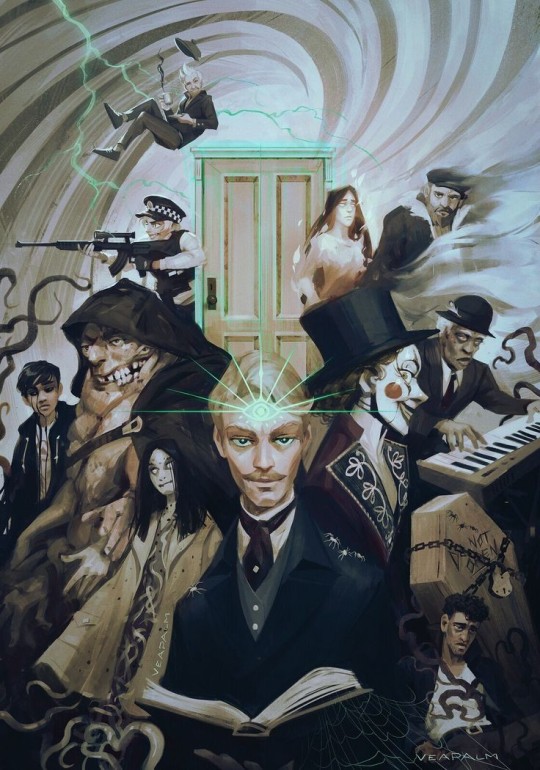
45 notes
·
View notes
Text
i go to the mag protocol tag looking for new character art, i leave the mag protocol tag having seen an absurd amount of content about two text-to-speech voices that are in love
#not complaining!!#magnus protocol#magpod#magnusarchives#tmapg#tma#the magnus archives#the magnus archives protocol
48 notes
·
View notes
Text

One way or another. Together.
#Hello Tumblr#I have returned and am carrying presents to excuse my absence. Please accept this immensely sad Magnus Archives fanart#sorry for disappearing#I have a full time job now and I forgot other social media than insta exists#I have drawn other stuff in the meantime lmk if I should post it on here too#illustration#art#procreate#fanart#Magnusarchives#the magnus archive fanart#the magnus archives#magnus archives#jon sims#martin blackwood#the ceaseless watcher#jonmartin
3K notes
·
View notes
Text
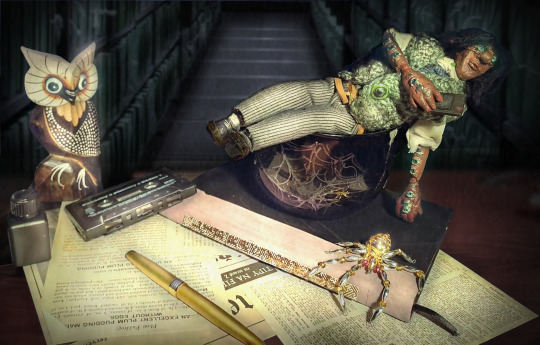
I did a thing! So hyped for protocol lol This was my first time making a doll and photo editing. Proud of myself for finishing it <3
7 notes
·
View notes
Note
So. I've been not so friendly reminded that this blog exists, and wallowing in emotions inside one particular head isn't the only option, so here I am, I guess, with my own apology. No ukulele in this one, but I can play pipe.
I can't say that I really am sorry: my journey so far hasn't been so much about remorse as about relearning humanity once again, so I know I should hypothetically feel sorry, but the only thing I can offer to everyone I have wronged is a confession that I understand their points of view. My whole long life kind of has been devoted to understanding and seeing and Knowing, yet I didn't bother viewing others as anything more than pawns for a very long time. At least since I lost my dear Barnabas.
So, first and foremost: Jon. My archive, my main victim, my passion project. I hope you will have a fulfilling life with little to no supernatural occurrences now, Elsewhere. I shouldn't have put you through every horror imaginable in order to shape an ultimate weapon. I see you (figuratively in this instance) as a person, I see you as a human being, and I am sorry.
Martin. You are one incredible bastard: lying to the kind of creature I was then and tricking me into underestimating you, sticking to Jon throughout the whole ordeal and making the hardest decision one can possibly make. You are strong, and you will only grow stronger from now on, and I wholeheartedly wish you will find peace.
Timothy Stoker. Though I kind of wish you had more respect for authority, your lack of such is astounding. You have proven yourself to be a good, honest man, and I dare to think have we met under other circumstances we would become good friends; I hope your friends will value you as much as you and Sasha valued each other.
This brings me to Sasha James. I am unable to recall the real you, as I am no less prone to Stranger's memory mumbo-jumbo than anyone else, but I know a couple things: you were incredibly smart, you would be a rightful successor to Gertrude weren't this whole institute about bringing the apocalypse, and you were too young to meet such awful demise. If you are out here, I wish just as much happiness and serenity for you as I do for everyone else.
And Peter. I don't know what to say to you, but despite all schemes and mind games we played, trying to put our respective patrons on the throne, I thoroughly enjoyed your rare company and I loved you as you were. I was devastated to see you die, it was as if my heart was ripped out of my chest all over again. I love you still, and with this I bid you one last goodbye and dare to advise you against finding yourself in one of those on-and-off situationships again. It may have fed the Forsaken before, but here a relationship like ours will be straight up unhealthy with no benefit to you, and you should avoid abusive fucks like me.
As for Barnabas... I don't have much to say, partially because I doubt there is a trace if you left in this particular reality, partially because I have said it all to the thought of you, to the phantoms my brain created under certain chemical influences throughout the years. My heart aches, but there are no tears left to cry. I miss you.
On that sad note I shall finish my letter and leave you all in peace.
Yours, Jonah Magnus. (The Magnus Archives fictive)
6
#fictionkinfessions#fictive#jonahmagnusfictive#magnusarchives#apology#memories issue#prevabuse#death cw#torture cw#i guess#shipping issue#mod party cat
4 notes
·
View notes
Text
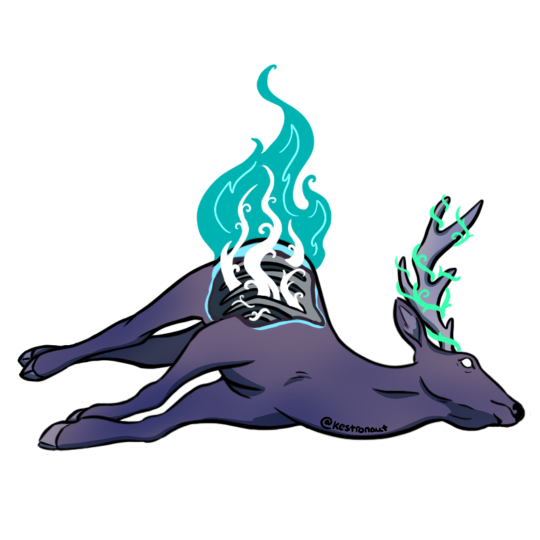
Rot.
Another magnus inspired sticker! Physical versions coming soon.
31 notes
·
View notes
Text
The Magnus Archives has officially nested in the attic of my brain
I am keeping this wasps’ nest
#the magnus pod#the magnus institute#the magnus archives#magnusarchives#magnusarchivesfan#jane prentiss#Wormmsss
14 notes
·
View notes
Text
You know, after you've experienced the joys of indoor skydiving you really start to feel the call of the vast a lot more
10 notes
·
View notes